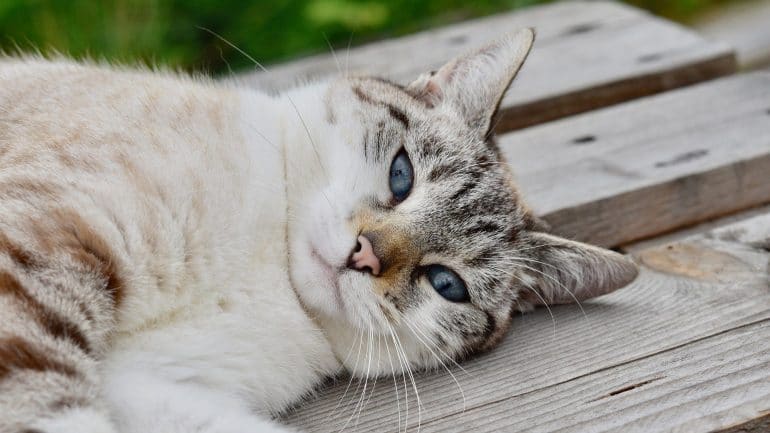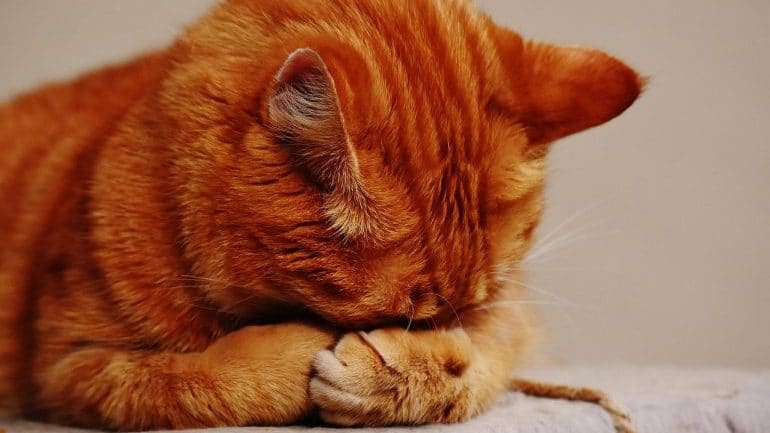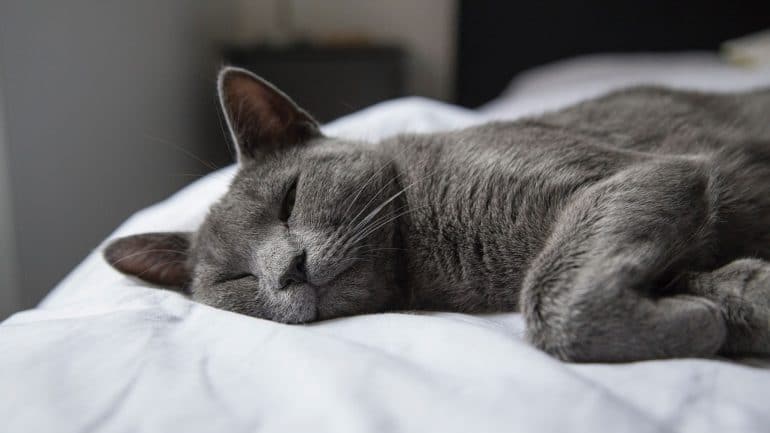How Much Do Cats Sleep & Why Do They Like Napping?
written by / November 12, 2019

Cats are adorable all the time, although they’re never cuter than when they sleep. But how much do cats sleep, really? And why do they sleep so much?
These questions must have crossed your mind once or twice. Probably while you were frantically getting ready for work while your kitten slept peacefully without a care in the world. Or maybe when you were tossing and turning in your bed as your cat snoozed next to you.
Finding out the answers can not only make you a better owner but also a better friend to your precious furball.
How Much Do Cats Sleep on Average?
Cats generally sleep between 12 and 16 hours a day. In fact, the only other species that seem to get more shut-eye than kitties are opossums and bats.
Although it’s been commonly believed that felines are nocturnal animals, they are in fact, crepuscular. This means that they are most active during dusk and dawn. First-time owners may think it strange that their pet spends most of the day lazing around and gets hyper around twilight. Don’t be alarmed! This is all part of a cat’s daily routine.
When Do Cats Sleep?
Your feline companion will typically fall asleep after a big breakfast, oblivious to your many attempts to engage it in some kind of activity during the day. And it will finally become active again after dark, just as you’re about to call it a day.
This is the result of a cat’s evolution and physiology. Like big cats in the wild, domestic kitties are most energetic when the sun sets because twilight is a perfect time for stalking and hunting prey. You wouldn’t catch a big cat sleeping on the job, would you?
And although your pet doesn’t have to rely on hunting to survive, instinct still plays a big role in a cat’s behavior. It may not be a lion or tiger, but that doesn’t mean it’s not ready to pounce on anything that moves, wiggles, or rolls.
It’s not uncommon for your kitty’s sleep behavior to change over time. Just like other domesticated animals—ahem, dogs—cats might adjust their sleep time to their owners.
In fact, a 2013 study on cats and sleep showed that housing conditions can affect the feline circadian rhythm. According to the study, cats that lived and spent most of their time in small houses with limited outdoor space developed sleeping habits similar to those of their owners.
In other words, pets will sleep less when you’re awake and sleep more when you hit the hay. Of course, not all cats do this. And don’t worry if your furry companion continues to sleep soundly even when you’re up. This doesn’t mean it doesn’t like you. It’s just normal for a cat’s sleep hours.
Another reason why kitties might change their sleep behavior is food. Many house cats adjust their sleep to feeding time, and that’s why they tend to sleep more than street cats who have to rely on their own wits to get food.
Sleep time depends on age, too. Small kittens are known to snooze for as many as 20 hours a day. On the other hand, when they reach the age of seven, they get tired more easily and need more rest. Just like humans!
Why Do Cats Sleep so Much?
The primary reason behind your cat’s excessive sleeping is energy conservation. This is again connected to big cats living in the wild. For them, food doesn’t grow on trees, nor do they have you feeding them at regular times of the day. It’s hard work chasing after prey, and they need all the energy they can get.
Domestic cats also use up a lot of energy playing, hunting, kneading your favorite blanket, and eating, and they need rest to replenish. The more they run around, the more sleepy cats will be.
Another aspect that affects how much your pet sleeps is the weather. The weather doesn’t only impact a cat’s sleep, it also affects their mood. Cats tend to sleep more on rainy days. This is true even if your furry pet doesn’t go outside that much. When the weather is cold, overcast, or wet, your kitty will yawn and settle down for a nap.
Sometimes cats can sleep for longer than normal because of an underlying health condition. If you notice your cat sleeping all day and not eating, or it’s not as playful and active as it used to be, it’s time for a trip to the vet. The same goes if your cat is sleeping less than usual. Keeping a close eye on its sleeping habits can show if it’s in pain or suffering from some kind of gastrointestinal issue.
It can happen that the vet gives your cat the all-clear and says there’s nothing wrong with it, medically, but you still see your cat sleeping more than usual. This could be a sign of depression. In that case, you need to make some changes to its environment and diet. Make sure it always has fresh water, stock up on its favorite treats, and try to play with it more.
Another reasons why cats sleep is because they’re overweight. If you want your furry companion to be more lively, switch to a healthier diet. Forget the treats and maybe incorporate some playtime into your kitten’s day.
Finally, it’s possible that a cat sleeps all day out of plain old boredom. If this happens, try introducing some new toys for it to play with. But to really cheer it up, spend some quality time with your pet. They may not always show it, but domesticated cats love their owners.
It’s important to remember that just like humans, changes in sleep patterns could be an indicator of trouble. After all, we use apps to monitor our health through our sleep quality, so why shouldn’t we pay as close attention to our feline friends?
How Much Do Cats Sleep?
How much sleep felines get depends on the type of sleep. Cats go through two stages of sleep, REM (rapid eye movement) and NREM (non-rapid eye movement) sleep. However, unlike people, the sleep cycle is shorter in cats, and they spend less time in each alternating stage than people normally do.
You may think that your furry friend is fast asleep, but it’s probably just napping. Interestingly, 75% of the time felines are sleeping, they’re actually just dozing. This cat sleep cycle, similar to a human’s light sleep stage, commonly lasts between 15 and 30 minutes. Cats still get the rest they need, but they remain alert and ready to jump up at the slightest provocation.
That’s why you may see some strange cat sleeping positions during the light sleep stage. Since they’re only snoozing, cats will position their body in a way that will enable them to pounce into action immediately. So it’s not unusual to see a sleeping cat in an upright or sitting position. Owners will notice that in this stage, the kitty usually has one eye half-open, or its ears will twitch toward noises, like the fridge being opened or treats being handed out.
When your pet stretches out and rolls on its side, it’s probably moving from slow-wave to REM sleep. Now, humans generally spend an hour and a half or two hours in deep, rapid sleep, while to a cat, deep sleep is only six minutes long, or about a quarter of its total sleep time. This stage is crucial for the body to repair and regenerate itself, keeping the feline healthy and full of energy.
How much time they spend in deep sleep also depends on age. Senior cats typically spend 30%–40% of sleep time in REM sleep, while small kittens fall directly into REM sleep and don’t change cycles until they’re about a month old.
Do Cats Dream?

REM sleep is also the stage when your feline pet dreams. If you see your cat twitching while sleeping, or its whiskers or paws are quivering, it’s probably dreaming. During this time, cats are most likely to be fully relaxed and sleep curled up in a ball or stretched out on their side.
Surprisingly, the dreams cats have and the science behind dreaming don’t differ that much from that of humans. Researchers say that when a cat is in REM sleep mode, the electrical activity pattern in a sleeping feline’s brain is almost the same as it is in a sleeping human. Also, the hippocampus, the part of the brain that controls memory, has all the same pieces in humans, cats, dogs, and rats. So if we dream as a way to process the information we experienced during the day, so do cats.
Young animals usually dream more than older ones probably because everything is new to them. So that’s why a kitten sleeps all day—it has more stuff to process in its dreams.
Kitties can have good and bad dreams. Owners report that cats that have been abused or were missing from their home for a longer period of time experienced nightmares. On the other hand, some kitties purr in their sleep, which indicates that they’re probably dreaming of playing with their favorite toy or rolling in some catnip.
What Do Cat Sleeping Positions Reveal?
The way a cat sleeps provides plenty of information about its mood and behavior. So the question “How much sleep do cats get?” is as important as “How do cats sleep?”
Tucked-in Paws
Also called the cat loaf, hover-cat, or potato cat, for obvious reasons, this hilarious posture means that even though the cat is enjoying its nap, it’s still aware of its surroundings and ready to spring into action if necessary. This sleeping position is common in a noisy environment. Don’t be alarmed if its head drops after a while. It’s simply being lazy!
Sleeping on the Side
Seeing a cat asleep on its side is very common as this is one of the most comfortable sleeping positions for cats. When in this position, they feel safe in their environment and they have no need to be alert. It could also mean that the feline has a strong bond with its host family and is not afraid of humans in general. If you see the cat twitching in sleep while lying on its side, you can be sure that it’s in deep sleep.
Curled up in a Ball
Why do cats sleep in a ball? A classic position for cats, it means that it’s trying to preserve body heat while at the same time not revealing any vulnerable body parts. If you see a cat sleeping curled up, it’s probably trying to tell you that it wants to be left alone.
Belly Up
There’s something incredibly funny about a cat sleeping on its back, limbs stretched out. This is very rare for cats as it exposes their most vulnerable parts, like their stomach. So why do cats sleep on their backs? Probably because they feel safe and comfy around you. If this isn’t a sign that it loves you, I don’t know what is.
But just to be on the safe side, resist the temptation to rub its belly while it’s in this position. You’ll most likely end up with a nasty cut on your hand.
There’s no doubt that cats’ sleeping positions are hilarious and meme-worthy, but where felines sleep is another source of amusement.
Hidden Away in Enclosed Spaces
How much do cats sleep, and where do they sleep? The answer is laundry baskets, shoe boxes, drawers… Cats love to sleep a lot and they prefer enclosed spaces because it makes them feel safe.
On Top of the World
Cats prefer sleeping on higher surfaces because it keeps them warm and also far away from predators. Another advantage is that this way, they can survey their surroundings and better see what you’re up to. Who knows? You might be heading toward the food bowl.
Sleeping with or on Their Owners
Why do cats sleep on you? The obvious reason is heat. Cats like to be warm, and that’s why they nap in your lap or next to you, especially in the winter. On top of that, they feel comfortable and safe next to their owners, and sleeping close to you is their way of showing affection.
How Can You Improve Your Cat’s Sleep?

Cats do sleep a lot, but even they can experience sleep issues. So what can you do?
- Give your cat healthy food. Food rich in nutrients will improve your cat’s sleeping habits.
- Play with it. Playing with your kitty can tire it out—and also make it happier and more spry.
- Feed it at night. There’s nothing better than going down for a catnap after a big meal.
- Give it some supplements. Melatonin is a natural hormone secreted by the brain’s pineal gland. You can use melatonin for cats as a sleep aid. It may also treat hair loss, anxiety, and senility in felines. However, consult a vet for the right dosage and to avoid possible side effects.
FAQs
How much do cats sleep a day?
Cats usually sleep 15 hours a day. Although it varies greatly according to age, disposition, the weather, and their overall health, if you notice that your pet is sleeping significantly less or more than usual, consult a veterinarian. It could be nothing serious, or it could be a signal that your cat is unwell.
Is there cause for alarm if I see my cat sleeping with its eyes open?
Sure, it looks strange, but generally there is nothing wrong with this. It’s just a sign of a change in cat sleeping patterns, i.e., your fur-iend is entering deep sleep. In some cases, the vet would prescribe eye drops, but more often than not, cats sleeping with their eyes open is a sign that they’re just a little bit quirky and weird.
Do cats snore?
Yes, they are known to snore from time to time. Not to worry as this is nothing serious. It’s merely the result of airways getting obstructed from skin near the soft palate. Luckily, a cat snoring is still quieter than most human snores.
Why do cats sleep on your head?
No one really knows for sure, but the most likely cause is warmth. Given that people lose most of their heat through their head, it makes sense that your cat could sleep near your head to get warm. It could also be that your pet likes the way you smell and at the same time is marking you with its scent. Finally, it may mean that your cat likes being as close to you as possible. Enjoy it while you can.
Can cats suffer from sleep issues?
A cat has a sleep schedule that can be affected by some of the same sleep disorders as people. Felines can experience narcolepsy and sleep apnea, especially if they’re obese. Sleep apnea is also more common in Persian, Himalayan, and Exotic Shorthair breeds, which are flat-faced and therefore more prone to breathing difficulties.
In Conclusion
Cats are one of the most popular pets in the world. But owning a cat takes responsibility, too. You need to know about your cat’s behavior as well as answers to questions like, How much do cats sleep? What does it mean if your cat is sleeping too much or not enough? How can you help your cat sleep better? Having all the information will help you better understand your feline and love it even more, if possible.









Warning: Undefined array key "format" in /home/602518.cloudwaysapps.com/cspedpjass/public_html/wp-content/themes/disturbmenot/template-parts/post-item/post-comment.php on line 23
Warning: Undefined variable $commenter in /home/602518.cloudwaysapps.com/cspedpjass/public_html/wp-content/themes/disturbmenot/template-parts/post-item/post-comment.php on line 27
Warning: Trying to access array offset on value of type null in /home/602518.cloudwaysapps.com/cspedpjass/public_html/wp-content/themes/disturbmenot/template-parts/post-item/post-comment.php on line 27
Warning: Undefined variable $commenter in /home/602518.cloudwaysapps.com/cspedpjass/public_html/wp-content/themes/disturbmenot/template-parts/post-item/post-comment.php on line 29
Warning: Trying to access array offset on value of type null in /home/602518.cloudwaysapps.com/cspedpjass/public_html/wp-content/themes/disturbmenot/template-parts/post-item/post-comment.php on line 29